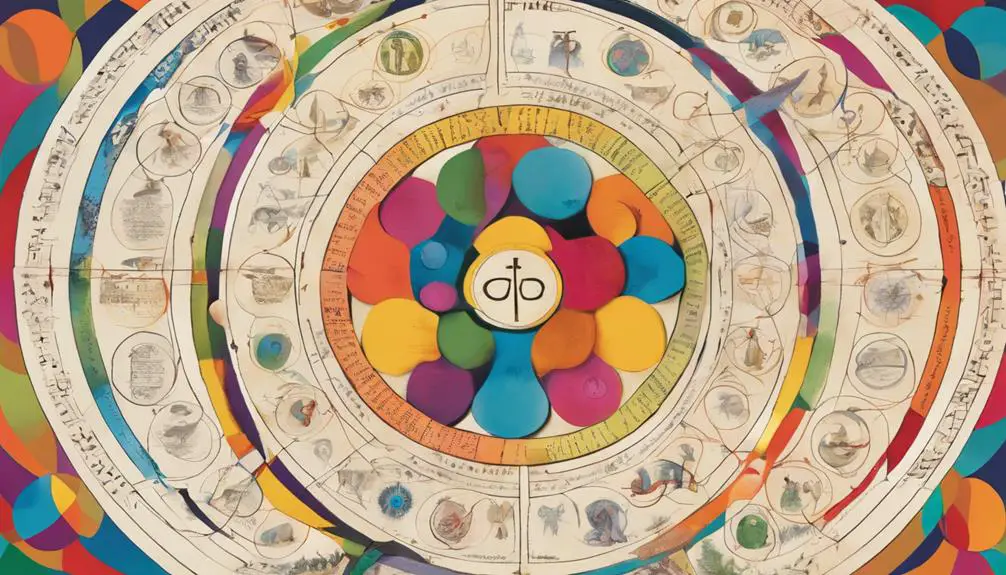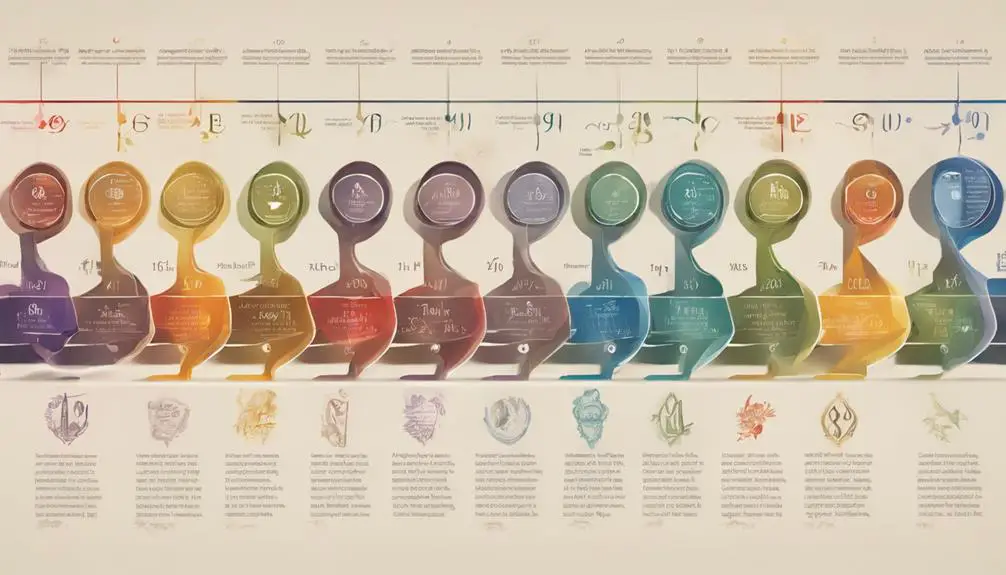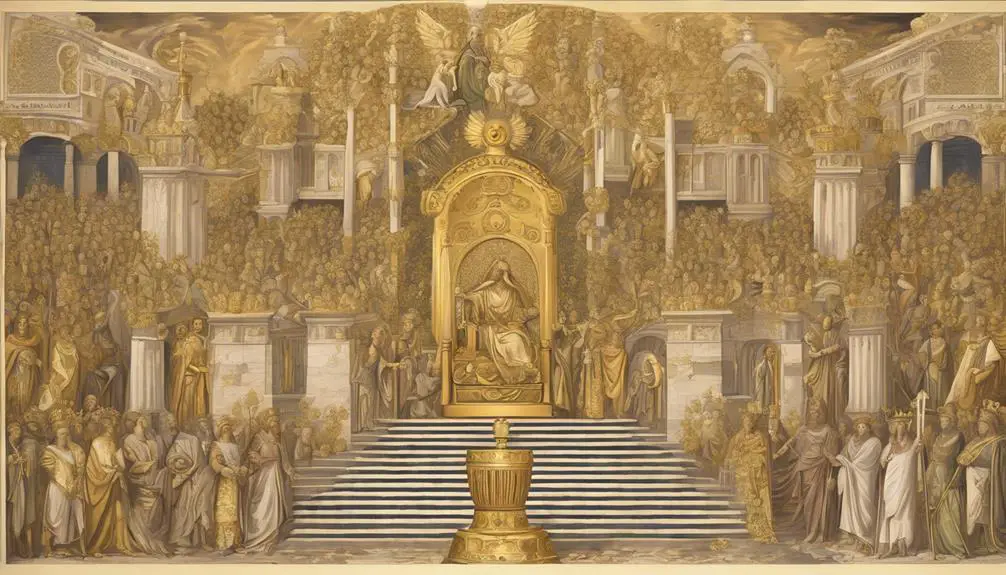Dive into the intriguing exploration of Dispensations in the Bible Chart, an insightful tool mapping God's changing interaction with mankind throughout biblical history.

Dispensations in the Bible Chart
You've probably come across various charts or diagrams mapping out the dispensations in the Bible. These visual tools often segment Biblical history into distinct eras such as Innocence, Conscience, Human Government, Promise, Law, Church, and Kingdom.
They aim to clarify how God's interaction with mankind has changed over time. Yet, is it universally agreed upon? Are these charts an oversimplification, or do they provide valuable insights?
By unpacking these questions, you'll be better equipped to understand the complexities and controversies surrounding this theological concept.
Key Takeaways
- Dispensations are divine administrative rules, marking distinct stages in God's relationship with mankind.
- The first dispensation, the Age of Innocence, highlights God's original intent for a sinless existence.
- Intermediate dispensations, from Conscience to Law, demonstrate humanity's need for guidance and moral accountability.
- The final dispensation, the Kingdom Age, prophesies a time of universal peace and spiritual awakening.
Understanding Dispensations in the Bible

To truly grasp the concept of dispensations in the Bible, you'll need to delve into a meticulous analysis of biblical history, examining each era through a theological lens. This approach will allow you to comprehend the Dispensation Significance, a crucial aspect of Biblical Interpretations.
Dispensations represent divine administrative rules, each outlining specific requirements for humanity. They're not just periods of time, but distinct stages in God's relationship with mankind, each ending in a test of obedience to God's mandates. Understanding these dispensations helps you discern the varying ways God interacts with humanity across different epochs, providing profound insights into His divine plan.
You'll find that failures to uphold these divine rules often result in severe consequences, driving humanity into new dispensations. However, it's essential to remember that while each dispensation may seem distinct, they're not separate ways of salvation. Throughout each era, salvation remains solely by God's grace.
In your exploration, you'll see the recurring theme of human failure, demonstrating our inherent need for God's grace and redemption. By understanding dispensations, you're not just studying biblical history; you're gaining a deeper comprehension of God's character and His unchanging plan for humanity.
The Age of Innocence: First Dispensation

Often regarded as the dawn of human existence, the Age of Innocence marks the first dispensation in biblical history, a period characterized by purity and freedom from sin's corruption before the infamous fall in the Garden of Eden. This was a time of Sinless Living, where man and woman, Adam and Eve, enjoyed an intimate relationship with God, unmarred by guilt or shame.
In Eden's Paradise, they were given dominion over all creatures and free access to every tree except one – the Tree of Knowledge of Good and Evil. This stipulation was the sole command they needed to obey. The absence of sin meant they didn't suffer from spiritual death, pain, sorrow or any form of suffering.
However, this Age of Innocence wasn't meant to last forever. The serpent's deception led to disobedience, introducing sin into mankind's history. The fall, as we know it, ended the first dispensation, resulting in expulsion from Eden's Paradise. Thus, the Age of Innocence, the first dispensation, illustrates God's original intent for humanity – a sinless existence in harmonious communion with Him, and the dire consequences of the disobedience.
From Conscience to Law: Middle Dispensations

Following the Age of Innocence, you'll find humanity's spiritual journey advancing into the subsequent dispensations, known as the Age of Conscience and the Age of Law, periods that significantly shaped mankind's relationship with the Divine.
- Age of Conscience: This era introduced Moral Accountability. Humans were challenged with discerning right from wrong, with their conscience as their guide. This dispensation ended with the flood, showcasing the consequences of ignoring one's moral compass.
- Covenant with Noah: Post-flood, God made a covenant with Noah, signifying a shift in divine-human relations. This covenant held significant implications, notably the promise of Earth's preservation despite human sin.
- Age of Law: The dispensation of law was inaugurated with the Mosaic Covenant. Here, God gave explicit laws to guide human behavior, underscoring the Covenant Significance.
- Covenant with Israel: God's covenant with Israel set them apart as His chosen people, tasked to uphold His laws. Their successes and failures illustrated the difficulty of perfect law adherence.
Each dispensation showcased unique facets of divine-human interaction, reflecting God's enduring patience and humanity's recurrent need for divine guidance. Yet, they also underscored humanity's inability to attain perfection, setting the stage for the next phase of God's redemptive plan.
Grace and Church: Modern Dispensation

After understanding the historical dispensations, you might comprehend why the introduction of Grace and the Church Age represents a pivotal moment in the spiritual narrative, marking a significant shift in God's interaction with humanity. This period, often referred to as the 'age of grace', is marked by an outpouring of God's unmerited favor, or grace, towards mankind.
Now, let's delve into the Grace definition. Grace, in theological terms, refers to the free and unmerited favor of God manifested in the salvation of sinners. It's a divine benevolence, love, and mercy given to humans without them deserving it. This grace is evident through the sacrifice of Jesus Christ on the cross for humanity's redemption.
Moving onto the Church Leadership, it's an integral part of this dispensation. The church leaders, under the guidance of the Holy Spirit, are entrusted with the responsibility of shepherding God's flock. They're to guide, protect, and feed the church with the word of God. It's through their leadership that the grace of God is continually revealed, understood, and experienced. Thus, the dispensation of grace and the Church Age intertwines God's abundant mercy with the crucial role of Church Leadership in disseminating it.
The Kingdom Age: Final Dispensation

Diving into the final dispensation, you'll find yourself in the Kingdom Age, a prophesied era that marks the culmination of God's divine plan for humanity. This Kingdom Age prophecy is more than just an end; it's the beginning of a new world order established by God Himself.
- Righteous Rule: The Bible predicts that Christ will reign in righteousness and justice. Your imagination might be captivated by the thought of a world devoid of corruption, where justice prevails.
- Universal Peace: Imagine a world where wars and conflicts are a thing of the past. This peace isn't only political but extends to all facets of human existence.
- Harmony with Nature: You'll envision a harmonious relationship between humanity and nature, where the predatory behavior of animals ceases.
- Spiritual Awakening: The Kingdom Age prophecy promises an outpouring of spiritual understanding, where every human knows God.
You can't overlook the final dispensation implications. They signify the ultimate fulfillment of God's promises and the restoration of His creation. Analyzing these implications provides a deeper understanding of God's divine plan and an invitation to participate in this coming Kingdom Age.
Frequently Asked Questions
How Are Dispensations Typically Represented in Different Bible Translations?
Dispensations are often represented in various Bible translations through an evolution of Dispensationalism and Biblical periodization. You'll see themes linked to certain eras, defining God's unfolding plan for humanity. They're not explicitly stated but inferred from scripture.
It's like a mosaic, you piece together the fragments to understand the bigger picture. It's a complex but fascinating endeavor, requiring deep theological analysis.
Are There Any Controversies or Disagreements Among Theologians About the Concept of Dispensations?
Yes, there's considerable debate among theologians about dispensations. Some critique dispensationalism for being too rigid or overly simplistic.
These Dispensationalism Critiques often come from differing Theological Perspectives that emphasize the continuity of God's covenantal promises. They argue that dispensations can lead to a fragmented understanding of scripture.
It's a complex issue, and views can vary widely based on one's theological tradition and interpretation of biblical texts.
How Does the Concept of Dispensations Impact the Interpretation of Prophecies in the Bible?
Understanding dispensations can greatly impact how you interpret Bible prophecies.
With dispensational hermeneutics, you'll see prophecy fulfillment in a more chronological and systematic way.
Each dispensation provides a unique context that can shape the meaning of a prophecy.
It's essential to understand the specific dispensation a prophecy was given in and how it might be fulfilled in different dispensations to grasp its full meaning.
Are There Any Cultural or Historical Contexts That Influence the Understanding of Dispensations?
Yes, cultural and historical contexts do influence the understanding of dispensations. You'll see this when you delve into 'Dispensations and Salvation'.
Historical factors shape 'Dispensational Hermeneutics Understanding', impacting how we interpret the Bible's prophecies. For example, the cultural context of a prophecy can alter its perceived meaning.
Therefore, you should always consider these contexts when studying dispensational theology.
Can You Provide Some Examples of How the Concept of Dispensations Is Used in Biblical Teaching or Preaching?
Sure, you can find examples of dispensational use in biblical teaching. Consider Dispensational Hermeneutics, it's a method of interpreting the Bible that acknowledges different dispensations, or periods, in God's dealing with mankind.
Another example is Dispensational Eschatology, it's the study of end times as outlined in the Bible, broken up into different dispensations. These concepts often shape sermons and biblical studies.
Conclusion
In wrapping up, you've journeyed through the Bible's dispensations: from the Age of Innocence, through conscience and law, to grace and the church, and finally, the Kingdom Age. You've seen the divine framework, God's management of human history.
This isn't just theology, it's a personal invitation to understand His plan. So, ask yourself, where do you fit in this grand narrative? It's time to respond to God's call in your own dispensation.



Sign up